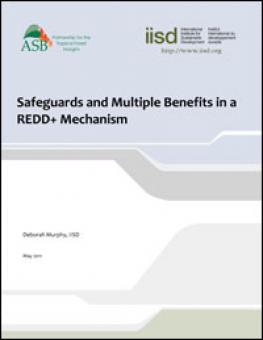
Safeguards and Multiple Benefits in a REDD+ Mechanism
IISD has partnered with the ASB Partnership for the Tropical Forest Margins at the World Agroforestry Centre (ASB-ICRAF) to deliver a project that builds policy capacity in developing countries engaged in United Nations Framework Convention on Climate Change (UNFCCC) negotiations related to reducing emissions from deforestation and forest degradation in developing countries, and the role of conservation, sustainable management of forests and enhancement of forest carbon stocks in developing countries (REDD+).
This paper explores the relationship between safeguards and multiple benefits in REDD+ activities, focusing on the possible institutional and governance structures that could facilitate attaining multiple benefits and respecting safeguards. It highlights key issues for further negotiation and explores options for moving forward. A draft of this paper was developed as an input to two regional workshops delivered by IISD and ASB-ICRAF. The workshops, REDD+ after Cancun: Moving from negotiation to implementation, took place in Douala, Cameroon, May 10-12, 2011 and Hanoi, Vietnam, May 18-20, 2011. The development of the paper was informed by discussions of the REDD Development Dividend Task Force during a meeting held in January 2011, and was finalized following the May 2011 workshops to reflect input from participants and main messages from the workshops.
The project is funded by NORAD under its Climate and Forest Initiative 2010 civil society support program.
Participating experts
Additional downloads
You might also be interested in
Good COP? Bad COP?: Food systems at COP29
The 29th United Nations Climate Conference (COP 29) in Baku failed to build on the notable progress made on food systems at COP 28. However, it wasn't all doom and gloom.
Baku Conference Sets New Collective Climate Finance Goal
The Baku Climate Change Conference (UNFCCC COP 29) delivered what the Earth Negotiations Bulletin (ENB) describes as “a milestone agreement that will inform climate action for years to come.” Countries set a new collective quantified goal (NCQG) on climate finance. The operationalization of the market-based cooperative implementation of the Paris Agreement (Articles 6.2 and 6.4) was another major outcome. Yet, parties could not reach agreement on a number of issues.
What to Expect at Plastics INC-5
Q and A with Tallash Kantai of Earth Negotiations Bulletin on INC-5.
What Drives Investment Policy-makers in Developing Countries to Use Tax Incentives?
The article explores the reasons behind the use of tax incentives in developing countries to attract investment, examining the pressures, challenges, and alternative strategies that exist.